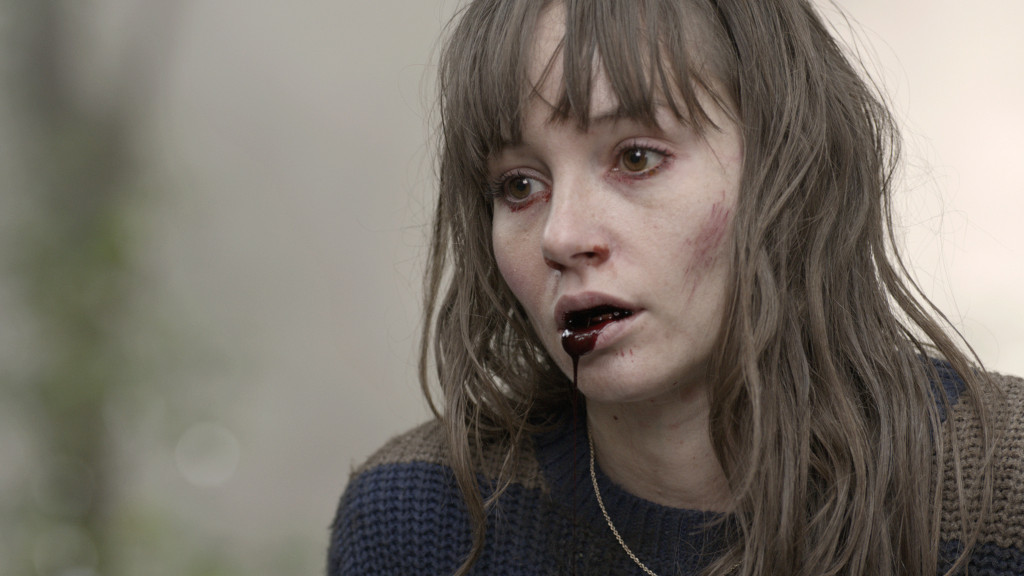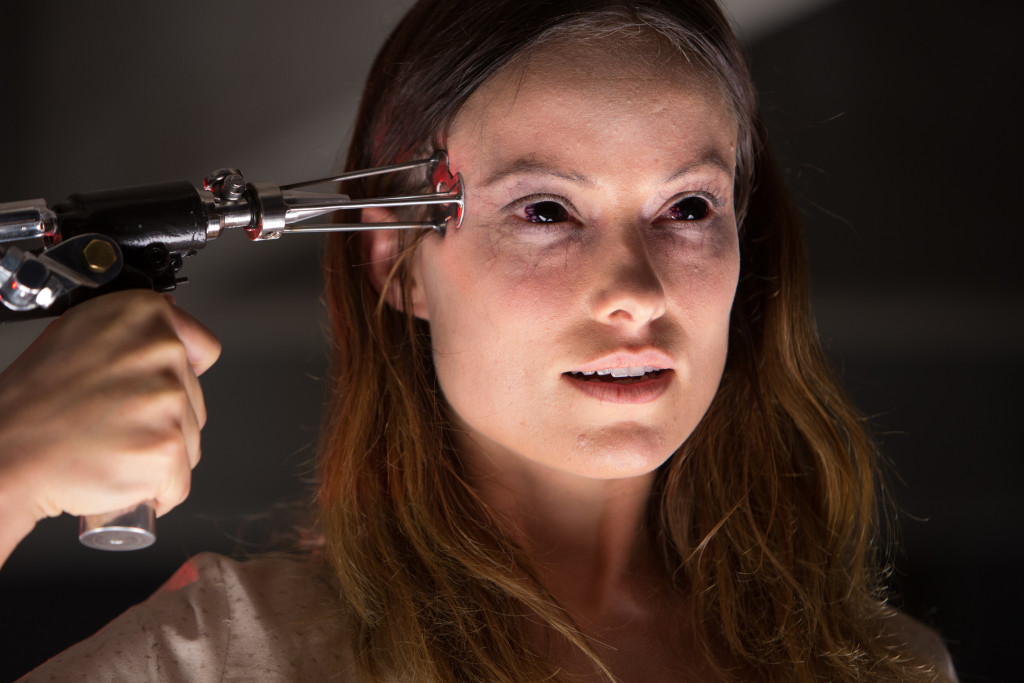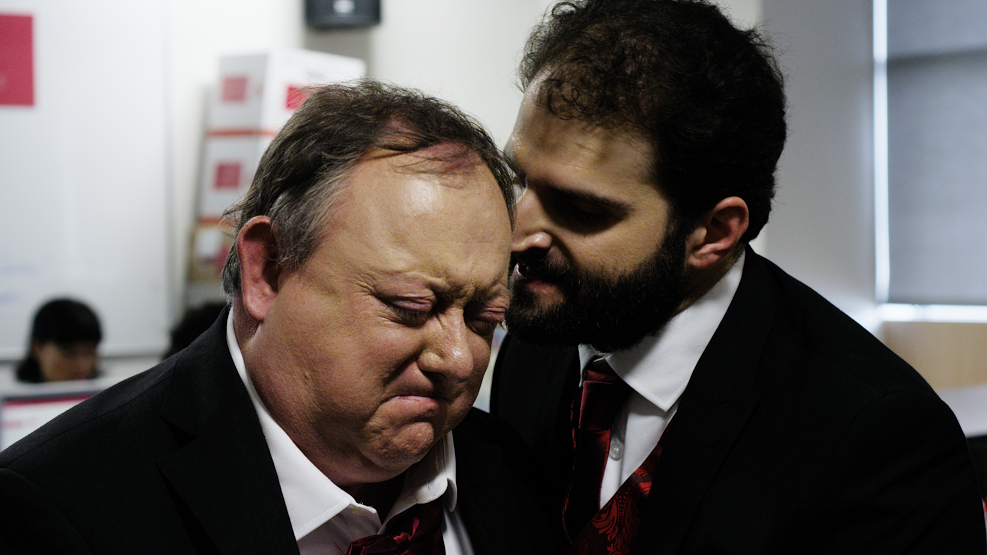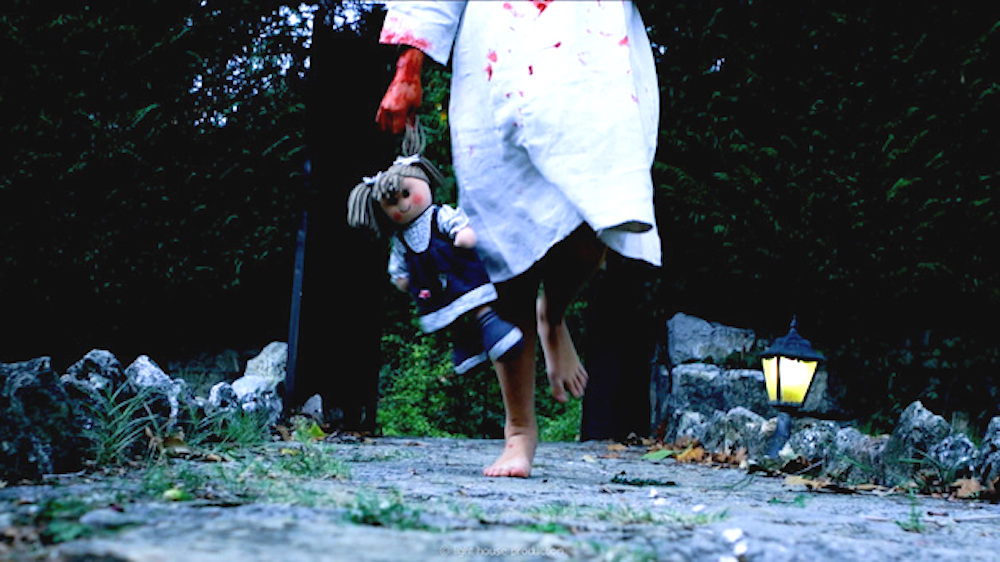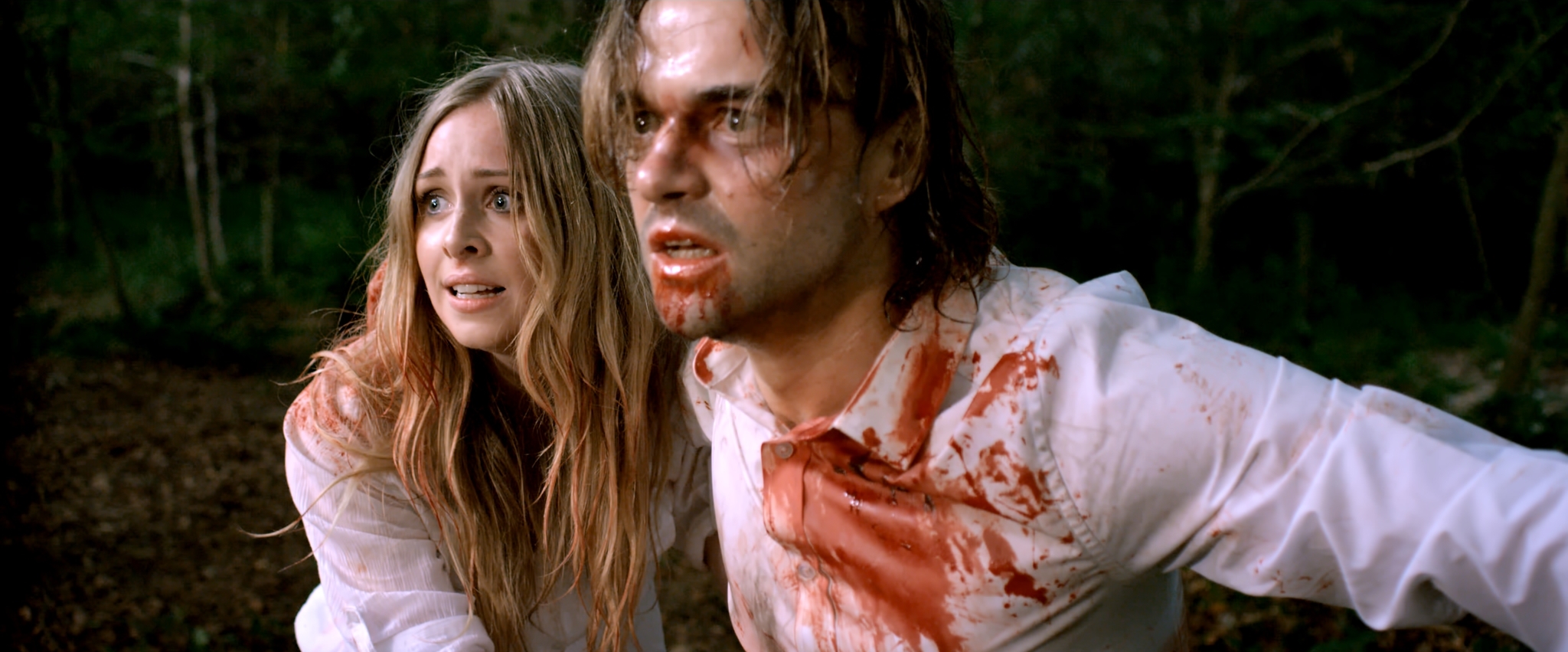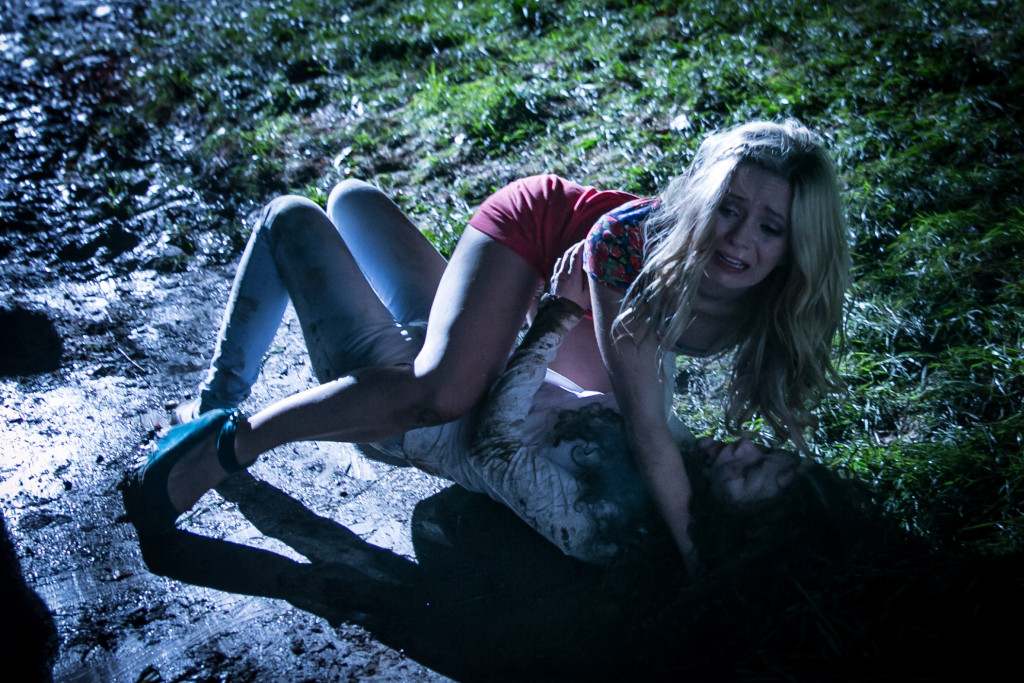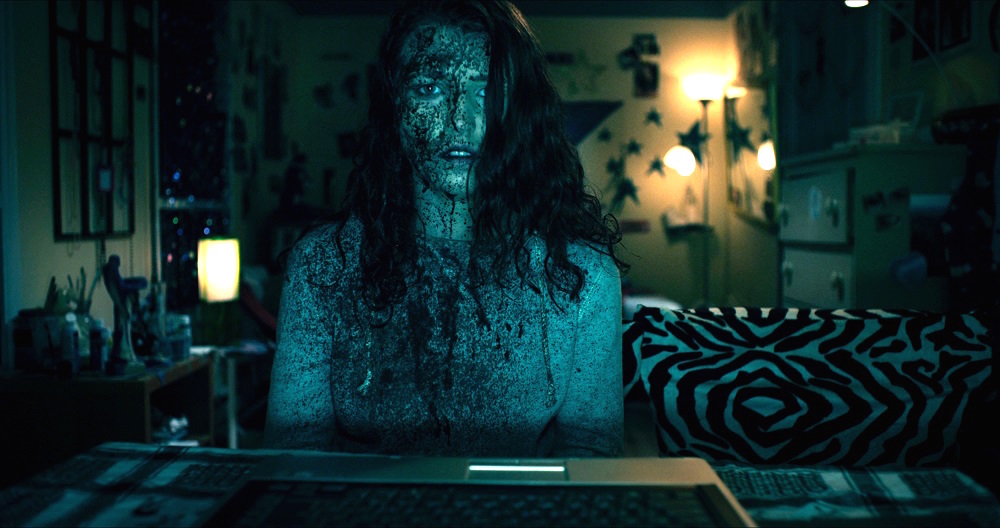FrightFest 2015 Dispatch: SUMMER CAMP, BANJO, GODDESS OF LOVE, And More








Summer Camp (world première)
There must be something in the Andalusian water to explain the ability of Spanish filmmakers to create so much genre cinema of the very highest order. Alberto Martini has long been in the background of this tendency, playing a role in the production of Iberian stunners like the [Rec] series, Sleep Tight (which he also scripted) and The Last Days - and now that he is finally stepping into the director's chair, his feature debut proves a savvy fireside gathering of different horror forms.
At the very start a news report announces that three Americans who were working at a summer camp in Spain have gone missing, and "the chances of finding them alive are slim." Cut to two days earlier, and we see one of these (probably doomed) working tourists, Michelle (Maiara Walsh), running through the treeline, blindfolded, her hands tied behind her back, with a male figure close at her heels. This, it quickly turns out, is not a hoary killer-in-the-woods routine but a trust-building exercise between the Camp El Buho counsellors before their young wards arrive.
While from this point on Summer Camp repeatedly wrong-foots characters and viewers alike with tropes and scenarios that seem all too familiar but are then slyly reoriented, trust between the counsellors will remain a key theme, as Michelle, Will (Diego Boneta) and Christy (Jocelin Donahue) have their loyalties and team spirit tested by an outbreak of murderous madness that will keep pitting them against each other.
Unfolding with the same sense of paranoid derangement as the infection whose ravages it observes, Summer Camp remains deft in its pacing and endless narrative surprises even as its characters become increasingly hobbled by a succession of injuries to their legs, feet and other body parts. Mixing aspects of the camp slasher, zombie flicks, Cabin Fever, Shrooms and Who Can Kill A Child? into a heady homebrew - and a genre jamboree - Summer Camp is always several steps ahead of us, and hilariously mean-spirited to boot. After spending so long hiding in the dark shadows of Spanish genre cinema, Marini has emerged a fully grown, freakily fun guy.
The Lazarus Effect
"It's about giving everyone that second chance they deserve," says Frank (Mark Duplass) of the pioneering scientific work that he, his long-term fiancée Zoe (Olivia Wilde) and their small research team are conducting in the laboratory of a Christian university, before the cameras of videographer Eva (Sarah Bolger). Their 'Lazarus serum', once injected into a corpse's brain, can not only resuscitate the dead, but also bring about rapid and radical evolution. Yet after circumstances force them to shift their experiments from a canine to a human subject, Catholic Zoe (whose name means 'life') will be confronted with past sins from which there can be no easy redemption.
Resurrecting ideas from Re-Animator (1985), Pet Sematary (1989) and Flatliners (1990), while nodding to Cujo (1983) and of course Frankenstein (1931), David Gelb's The Lazarus Effect makes no great claims on originality, although it does rewire its source materials into something ever so slightly different, while following the Blumhouse formula of contained creepiness and slickly packaged jump scares. Wilde and Duplass do their best to humanise the high concept, which ends up playing like a malevolent remix of Lucy (2014). For as the corridors of Zoe's overdeveloped neural network still echo with her repressed childhood emotions and memories, she becomes a psychotic superhuman, trapped in the hellish outer fringes of science and religion. Which is a long way from Gelb's previous feature, the documentary Jiro Dreams of Sushi (2011) - even if the 'Lazarus serum', applied to a raw fish carcass, might just have engendered Dead Sushi (2012).
Banjo (world première)
Abused and emasculated by his money-chasing girlfriend, humiliated and bullied by his work colleagues, and recently off his meds, Peltzer Arbuckle (James Hamer-Morton) inadvertently conjures his imaginary childhood friend and unrestrained id Ronnie (Damian Morter). Yet far from being merely a force of fun-loving chaos like Drop Dead Fred (1991), Ronnie's last visit had led Peltzer to go on a shooting spree at his high school - and he is now set on driving the downtrodden drone to execute an office massacre.
If a would-be man's arrested development and inability to put away childish things are key themes in Liam Regan's feature debut Banjo, juvenility pervades the film too, from the uneasy fixation on sex to the cartoonishness of the characters to an utterly gratuitous preoccupation with vomit, urine, used tampons and bloody penile tissue damage - as though the whole world of Banjo were being filtered through the priapic, ultraviolent perspective of an overgrown schoolboy. That childish sensibility is informed, if perhaps not entirely excused, by the influence of a certain strain of Eighties trash horror - hence Kurt Dirt's synth-heavy score and an appearance by a brick phone to fix the decade, and hence the cameo from Troma's Lloyd "The Toxic Avenger" Kaufman (and, for the eagle-eyed, an "I love Tromaville High School" sticker in the background) and the setting in a town named 'Henenlotter' (after Frank Henenlotter, director of 1982's Basket Case and 1988's Brain Damage). The problem is, though, that both horror cinema and the world have done a lot of growing up since then, making Banjo seem something of a puerile throwback.
Hostile
"Where am I? I don't really know. I wanted to take a shortcut. Don't worry, I'll be right there. No, I'm not lost."
The speaker is on her mobile phone, by her car, on a woodland road - and if handheld 'POV' shots, taken from the tree line, suggest that we are in familiar slasher territory, the appearance of a blood-covered girl, and the woman's murder shortly afterwards, seem to confirm this. Yet 14-year-old writer/director Nathan Ambrosioni is determined to get his viewers much more lost than they ever realise, as Hostile blurs together multiple subgenres and interlaces different explanatory frames to create a story whose disorienting overdetermination makes for map-free fun.
A mere month after she has adopted teenaged sisters Emilie (Julie Venturelli) and Anna (Luna Belan), Meredith Langston (Shelley Ward) becomes aware of another presence in the house, even as the girls' behaviour becomes more aggressive and menacing. It seems to be a ghost story, but there are also hints of abuse, torture, madness, possession, hallucination, Satanic invocation… And then there are the girls, creepy and conspiratorial, who, like vampiresses from some 70s Eurosleaze, "wear their nightdresses all day long" - a detail whose oddness is expressly noted even by one of the characters. 'Objective' camerawork soon gets mixed up with diegetic footage documented by a television crew and by a pair of would-be exorcists, as well as with a 'found' family video. It is a confidently mounted, genre-savvy ragbag that constantly confounds and wrongfoots without ever quite adding up or making complete sense. This protean quality may be dismissed by some as a symptom of the filmmaker's immaturity - but it is also where the uncanny finds its home.
Awaiting
"It's been a crazy couple of days, ay?"
So says Lauren (Diana Vickers) to Jake (Rupert Hill), a lawyer who has, after a car accident, found himself a captive guest at the isolated "shithole" home of the young woman and her tow-trucking, overprotective father Morris (Tony Curran) out on the Yorkshire moors. Mark Murphy's Awaiting begins in similar territory to Scott Graham's Shell (2012), with a father and daughter observed in their claustrophobic, not exactly "healthy" relationship that outsider Jake threatens to disrupt with his promise (to Lauren) of experience outside the box. Yet once all three are dressed in cracker hats for a Christmas dinner (in September!) where Jake must bear unhappy witness to Lauren's unnerving evocation of her departed mother for Morris, we have drifted closer to the unhinged father-daughter terrains of Sean Byrne's The Loved Ones (2009) - and by the time the film has slow-burnt its way through a succession of horrifically transgressive revelations to its axe-wielding climax, it is as though The Texas Chain Saw Massacre (1974) had transplanted itself to the backwoods of Northern England.
Chaining its baroque secrets to a studied social realism and a performance (by Curran) of quietly contained menace, Awaiting concerns itself with the genetic ties that bind. For, entrapping characters and viewers alike in an awaited possibility of escape that is repeatedly frustrated, this sick psychodrama sets city against country, North against South, and blood against blood, while dismembering family values along the way.
Goddess of Love (world première)
"You have to keep it all in fantasy," Chanel (Monda Scott) advises new pole/lap dancer Venus (Alexis Kendra). "You just have to be dripping with sex."
Chanel (not her real name) is instructing the novice in how best to fleece male clients of their money, but in fact it is love that Venus, in keeping with her all-too-real name, seeks. Quick to hook - and hook up with - Brian (Woody Naismith), an Australian photographer still grieving his wife's recent suicide, Venus notices her beau's erotic attention drifting and suspects that there is another woman in the picture. Yet much as Brian likes to photograph his subjects wearing carnivalesque masks, Venus is engaged in her own masquerade, putting on makeup and alluring attire to cover an affliction somewhat more dangerous than mere lovesickness.
Departing significantly from his previous genre films (Jack Brooks: Monster Slayer, The Shrine), director and co-writer Jon Knautz certainly keeps it all in fantasy, crafting his disturbing, at times hallucinatory portrait of erotomania by filtering events through Venus' own paranoid perspective, and only occasionally letting the mask slip to reveal the reality underneath. Kendra (who also co-wrote) gives her all in an astonishing, slippery performance - and while there is a 'bunny boiler' moment, this erotic thriller distinguishes itself from others by being told from the inside out, with far greater psychological insight (or is that obfuscation?) than is normally associated with this subgenre. The secret is finally let out - and the film's every last ambiguity let down - by an ending in which a figure of authority is allowed to overexplain all that has preceded.
This might be an homage to the end of Hitchcock's Psycho (1960), but it also serves to undo, in a disappointingly unsubtle manner, every fragile illusion and equivocation that the film has, along with Venus, so seductively constructed. Still, that seduction is perfection itself.
Suspension
A van is seen from above, monochrome and rotoscoped, rolling slowly up to a barn whose blood-red hue is the only splash of colour in a field of black and white, while accompanying film credits are presented in stylised boxed captions. If the opening of Suspension plays like a comic book come to life, that is because its protagonist Emily Hanson (Ellen MacNevin) is keen on turning her darkest thoughts into panelled sketchbook narratives whose contents are intermittently realised on screen.
An alienated, bullied teenager whose father was jailed for going on a killing spree a decade earlier, Emily writes comics (on themes rather close to home) to entertain her mute younger brother Jeremy (Connor Fielding). Yet on this night, as she draws a story for Jeremy about the violent return of their father in hoodie and borrowed mask, someone with a definite family resemblance really is closing in on the house with murderous intent - and as dusk turns to night, the stylised desaturation of the comic book reconstructions starts merging with Emily's actual situation.
Best known for his prolific work at the schlockier end of genre (sample titles: Alien Incursion, Goblin, Haunted High, Roboshark), here director Jeffery Lando takes us on a savvy spin down the psychological by-roads of the slasher. There is a silent masked killer, a moustachioed comedy cop, a webcast crew, and enough partying co-eds to fill several body bags - and the names of Emily's friends (Jason! Carrie!) are like breadcrumbs for genrehounds, pointing to different routes through this tangled narrative. In its fluid treatment of fantasy and reality, Suspension hangs its story on multiple hooks, before twisting in its final killer blow and hammering it home. You may well see it coming - although perhaps not in every detail - but Lando is certainly deft in handling the many modalities of this material.
Bite
Chad (The Drownsman) Archibald's Bite opens as 'found footage'. Casey (Elma Begovic) is persistently filmed by her two BFFs on a last bachelorette binge in Costa Rica, as she hits the booze and the dancefloor, meets a handsome local, and gets wedding jitters - not least because she does not share the enthusiasm of fiancé Jared (Jordan Gray) for having children. But then, just after this video footage shows Casey bitten by something in a secluded, insect-infested swim spot, Bite returns us to her New York normality, and to a more 'objective' style of filmmaking - although her friend's earlier recordings will continue to play different evidential roles in the subsequent story.
Having "caught a bug or something", Casey begins her rapid physical metamorphosis into an icky, insectoid creature (with shades of David Cronenberg's The Fly), gradually incorporating neighbours and loved ones into the nest that her apartment has become. This is pure body horror, focusing on the vomit and pus and oozy emissions that accompany Casey's entomological alterations - but it is also an allegory of a young woman's full, monstrous conversion to marriage, maternity and hardcore homemaking. Think Leigh Janiak's Honeymoon, with Kafka-esque sting in its tail.

More about Summer Camp
More about The Lazarus Effect
More about Hostile
More about Goddess Of Love
Around the Internet
Recent Posts
ALL THE PRESIDENT'S MEN 4K UHD Review: Deeper with Special Features
UNDERTONE: Hear it Early in a Dolby Cinema
Leading Voices in Global Cinema
- Peter Martin, Dallas, Texas
- Managing Editor
- Andrew Mack, Toronto, Canada
- Editor, News
- Ard Vijn, Rotterdam, The Netherlands
- Editor, Europe
- Benjamin Umstead, Los Angeles, California
- Editor, U.S.
- J Hurtado, Dallas, Texas
- Editor, U.S.
- James Marsh, Hong Kong, China
- Editor, Asia
- Michele "Izzy" Galgana, New England
- Editor, U.S.
- Ryland Aldrich, Los Angeles, California
- Editor, Festivals
- Shelagh Rowan-Legg
- Editor, Canada


